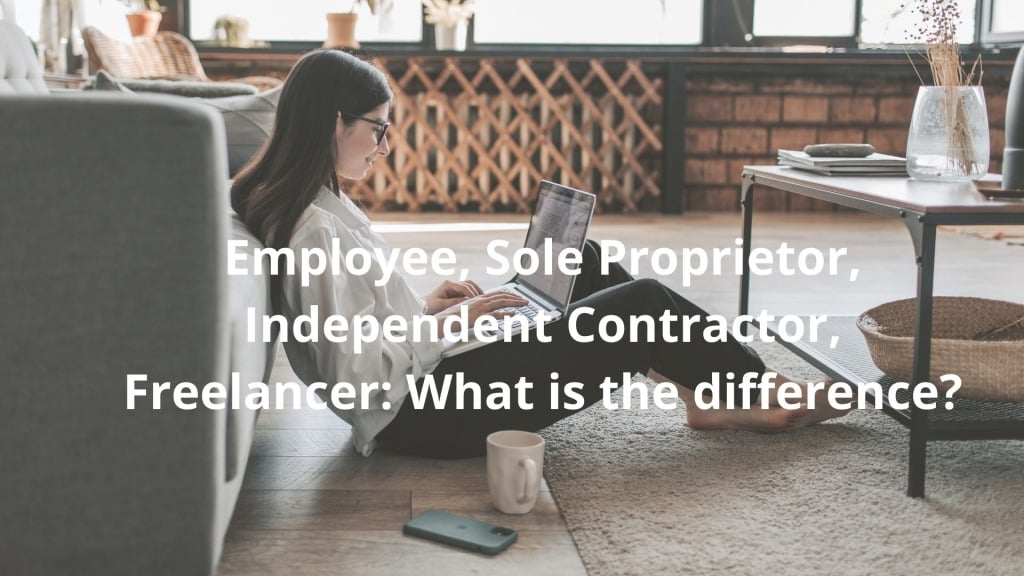Employee vs Sole Proprietor vs Independent Contractor vs Freelancer: Understanding the Differences
31 Jan 2023
23 Jul 2021
min read

Employment has undergone significant change in recent years – being ‘self-employed’ is more common than ever. But what does the term mean? Self-employment is an umbrella term that simply refers to an individual who is not ‘traditionally’ employed or subject to the oversight of an employer. Instead, they work for themselves and are their own bosses. The category of ‘self-employed’ includes freelancers, independent contractors, and sole proprietors. On the other hand, employees are subject to the control of an employer, meaning that they do not fall into the same category.
Employee
What are employees?
An employee is an individual who is hired by an employer to take up a particular job. Employees perform specific tasks or responsibilities for employers and are awarded compensation in return.
Terms of employment are set out in the employment contract and govern the relationship. Employee manuals/handbooks are also created by the employer and handed to the employee. They outline policies, guidelines, and other important information defining the employee-employer relationship. Check out our customizable template for an employee manual here.
How do employees work?
Since employees are hired by employers, they are subject to oversight by employers and are bound by the terms of employment set out by the employer in their employment contract. Employment contracts are crucial as they govern the employment relationship.
To have employee status, the following factors are typically present:
- The employee is obliged to carry out the task personally and cannot simply find or send a substitute.
- The employer is obliged to set work for the employee
- The employer has a certain level of control over how the employee does the work.
What rights do I have as an employee?
As an employee, you are afforded certain legal rights in the workplace. This means that your employer is obliged to uphold your rights as established under law. Some of the most important ones include:
- The provision of free personal protective and safety equipment (PPE)
- To have an annual paid holiday
- To have breaks at some point during the working day
- To have health and safety risks under control
You should note that a failure to comply (e.g., failing to follow instructions for PPE usage) might make you liable for disciplinary action or dismissal by your employer. The procedures and practices which apply to employees are typically set out in a company's health and safety policy and differ from company to company. If you need a customizable health and safety policy, you can find one here.
What are the advantages of being an employee?
- Steady payment and compensation
- Benefits – this includes healthcare, insurance, and tax. Some employers even provide free food or transportation allowance.
- Community (eg: other employees) and a collaborative working environment
- Professional training and development – as an employee, there is the prospect of being promoted to a more senior role where you receive greater benefits.
- Recognition by employer
- A set schedule – as an employee, you won’t have the hassle of needing to figure out when to work.
What are the disadvantages of being an employee?
- Lack of flexibility
- Subject to control and oversight by employer
- Often cannot choose exactly what they want to do/the nature of their tasks.
Self-employed
What does self-employed mean?
Self-employed simply means that you are employed by yourself. It is an umbrella term that can mean many things. In essence, it refers to titles that involve ‘non-traditional’ employment.
Independent contractors, freelancers, and sole proprietors all fall under the category of self-employed workers. These titles merely constitute different ways of being self-employed. Employees, on the other hand, are not self-employed.

It is important not to mix up self-employment with other terms. The term self-employed should only be used as a broad, general category. For example, whilst freelancers are always self-employed, not all self-employed people are freelancers.
Sole proprietor
What is a sole proprietor?
A sole proprietor refers to an individual who is the sole owner of an unincorporated business. This unincorporated business is also known as a sole proprietorship. Its defining feature is that it only comprises one individual, the owner.
Since sole proprietorships are only run by a single owner, the owner and the company are considered as a single body. As such, the owner is fully responsible for all liabilities and debts incurred.
Additionally, all profits generated through the sole proprietorship go directly to the owner. This means that the owner must pay personal income tax on all profits earned.
How are sole proprietorships different from other business entities?
Sole proprietorships are the simplest possible business form, making them very different from other more complex business structures like corporations, limited liability partnerships (LLP), and limited liability companies (LLC)
Sole proprietorships are different from other business entities as they do not constitute a separate legal entity and essentially just refer to the individual running the business. In this sense, a sole proprietorship is not distinguished from its owner.
What are the advantages of being a sole proprietor?
There are many advantages of being a sole proprietor which make it an enticing choice. These include the following:
Control
As a sole proprietor, you are in full control of the direction of your business, which clients you want to work for, which assets you want to use, etc.

Inexpensive and simple to set up
There are no formalities involved in setting up a sole proprietorship, meaning that the whole process is straightforward. No registration with the state is required – the mere business activities of sole proprietors are sufficient to establish a sole proprietorship. This means that costs on licenses, documentation and specific permits are eliminated.≠
Tax advantage
As mentioned earlier, the owner and the business are viewed as one, united body. This makes tax calculations straightforward – any income earned from the business is simply the owner’s income.
Owners benefit from what is called ‘pass-through’ taxation. Pass-through taxation points to the fact that their tax liability ‘passes through’ directly to their income tax. This guarantees that owners are not double taxed.
What are the disadvantages of a sole proprietor?
Unlimited/full liability
While the freedom you possess as a sole proprietor is beneficial in many aspects, one huge disadvantage is that you are personally responsible for all the debt, liabilities, and losses incurred.
Moreover, the fact that there is no separation between your personal and business assets means that you could potentially suffer quite significantly. Other entities are also entitled to sue you – meaning that they may take your assets if that is what the situation requires.
No continuity
When a sole proprietor dies, the business is dissolved and cannot be continued.
Difficulty in raising capital
It is almost impossible to get investors involved. As mentioned, since the owner and business are considered one body, this means that business and personal assets are mixed. Without independent business assets, investors cannot buy them or invest. This makes it hard for sole proprietors to raise capital for the business.
Are sole proprietors self-employed or employed?
Sole proprietors are sole owners of a business and are therefore self-employed.
A sole proprietorship enables the sole proprietor (owner) to operate and act independently without the oversight or control of an employer. Since they operate independently, sole proprietors do not receive a wage or salary but instead, receive income by providing services/products by dealing with clients on their terms.
Note that since sole proprietors are self-employed, they are also fully responsible for paying self-employment taxes.
Independent contractor
What is an independent contractor?
An independent contractor is a self-employed individual who is contracted to perform tasks or a certain job for another entity. They are not employees, meaning that they are not eligible for employee benefits.
Examples of independent contractors include dentists, doctors, construction workers, etc.
But what is the difference between an employee and an independent contractor?
While employees and independent contractors may very well be doing work of a similar nature and can be compensated the same sum, it is important to remember that their classification/title can bring significant legal damages, ie, regarding tax, healthcare, and insurance payment.
Although there is no ‘set’ test to determine whether someone is an employee or independent contractor, here are some factors the CRA (Canada Revenue Agency) considers to be particularly important. Whilst specific factors may vary between jurisdictions, this should give you a rough idea of things to consider:
- Control: This refers to the payer’s control over the daily activities of the worker. Generally, independent contractors are subject to less control and oversight. More importantly, however, is that payers cannot determine how an independent contractor fulfils the job, whereas employers can do so for their employees.
- Ownership of tools/equipment: Who invested in the tools? If the worker has, he is likely to be an independent contractor. Independent contractors are also more likely to have invested in their workspace.
- Payment: Independent contractors often hand in an invoice for their work rather than working for a salary.
- Working hours: Employees work for a certain, specified time that is set out in the terms of employment. Independent contractors, on the other hand, are their business entity, meaning that as long as they complete the work set for them, they are free to choose their hours/schedule.
- The permanency of the relationship: The general trend is that the more permanent the role, the more likely it is to be traditional employment rather than self-employment.
Do independent contractors have to enter contracts?
Yes - while they are not subject to the traditional employee-employer relationship, they nevertheless work under a contract and must complete whatever is stated in the contract. The payer will usually specify the work that needs to be completed by the independent contractor.

Regardless, contracts are crucial for avoiding disputes and making sure that all parties fully agree on the work to be completed, as well as the nature of the commercial relationship between them.
Freelancer
What are freelancers?
A freelancer is an individual who is self-employed and not committed to one employer. Since they work for themselves, unlike employees, they often work for several clients and are committed under several shorter-term contracts.
An example of a freelancer would be a professional video editor, journalist, or developer. Their title tends to not matter so much because freelancers often work on projects that are different in nature.
What do freelancers do?
Although freelancers are not employees of the firm, they may still be contracted to complete work that an employee would do.
The difference is that typically, freelancers work on a short time basis and earn wages per job/assignment. This stands in contrast to employees who earn a salary and work for long-term periods as set out in their employment contracts.
Are freelancers self-employed?
Yes – freelancers are self-employed. Since they work for themselves, they can work for more than one client, on a variety of projects.
But how are Freelancers and Independent Contractors different? Aren’t they both self-employed?
Yes, they are both self-employed. From a legal perspective (in terms of tax/employment), the two terms mean the same thing. They just constitute different terminology/labels. From a practical perspective, however, some subtle differences can help to distinguish the two:
1. Clients
It is more common for a freelancer to be working on different projects for several clients all at once. On the contrary, independent contractors are more likely to work for one client for a specified period, albeit still on a relatively short-term basis (eg: a few months).
2. Location of work
Independent contractors are more likely to work from the client’s office, compared to freelancers, who work often do not have proper working space and tend to work remotely.
3. Nature or scope of work
Since freelancers tend to work for multiple clients at a given time, they tend to take on smaller/ad-hoc projects, compared to independent contractors.
Freelancer v Independent Contractor: Which one should I hire for my company?
Neither is ‘better or ‘worse’ – it simply depends on your needs.
A freelancer may be the better choice if you:
- Need ad-hoc help
- Need help on a particular niche project or area
- Have work that can be done remotely
- Are not certain how long you’ll need help and do not want to enter a long-term contract
- Want to pay on an hourly basis
An independent contractor may be the better choice if you:
- Want a project/task to be carried out on a more consistent basis
- Want someone who can work from the office
- Want to pay someone a specified price for a particular piece of work
- Requires the work to be done by someone who will not work for competitor companies
Either way, if you want to hire a freelancer or an independent contractor, you will need to draft a contract that is clear and concise. We created a customizable freelancer/independent contract you can use here.
Summary
It is important to be clear about the various terms which fall under the category of ‘self-employment’, and how self-employment differs from traditional employment. While being a freelancer or independent contractor is similar in terms of how much tax you need to pay, the roles often involve slightly different benefits. Companies should also consider a variety of factors before determining which type of worker they want to hire for a certain project or role.
Please note that this is a general summary of the position under common law and does not constitute legal advice. As the laws of each jurisdiction may be different, you may wish to consult your lawyer.
Keywords:



